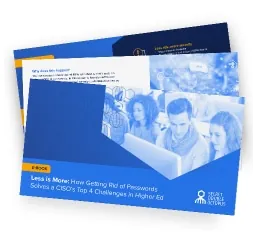Zero knowledge proof or protocol is a way for a “prover” to convince a “verifier” that a statement about some secret information is true without revealing the secret itself. The proof protocol may be interactive or non-interactive.
Example: a verifier presents a prover with a hash H, and would like the prover to provide proof that it has the secret data that hashes to H. The prover produce a zero knowledge proof that convinces the verifier that it has the data that hashes to H, without revealing the data itself to the verifier.
Read about the “Security Benefits of Passwordless”
Download Whitepaper

